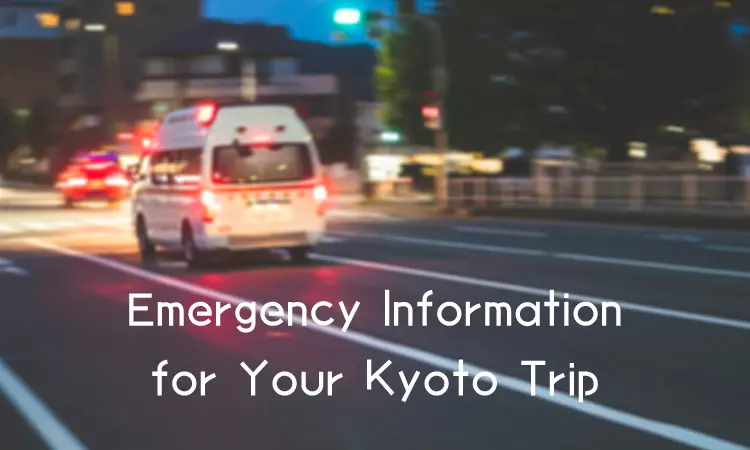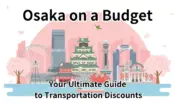Emergency Information for Your Kyoto Trip: Be Prepared and Stay Safe
Kyoto, with its ancient temples and serene gardens, is a dream destination for many travelers. But even in this peaceful city, unexpected situations can arise. Don’t let emergencies ruin your trip! This guide will equip you with essential information to handle any unexpected events during your stay in Kyoto.
1. Why Be Prepared?
While Kyoto is generally a safe city, being prepared for emergencies is crucial for any traveler. Natural disasters like earthquakes and typhoons can occur, and it’s always wise to know what to do in case of medical issues, lost belongings, or other unforeseen situations. By having a plan and knowing where to seek help, you can ensure a smooth and worry-free trip.
2. Emergency Contacts: Your Lifeline
Keep these essential phone numbers handy:
- Police: 110
- Ambulance/Fire: 119
- English-speaking assistance: Kyoto City offers a simultaneous interpretation service in English, Chinese, Korean, Spanish, and Portuguese for 119 calls.
For non-emergencies, you can contact:
- Your embassy or consulate: They can assist with lost passports, legal issues, and other emergencies.
- Tourist information centers: They can provide information on local services, transportation, and safety tips.
3. Natural Disasters: Staying Safe
Japan is prone to natural disasters, so it’s important to be aware of the risks and know how to respond:
- Earthquakes: If you feel an earthquake, take cover under a sturdy table or desk. Avoid windows and exterior walls. After the shaking stops, evacuate calmly and follow the instructions of local authorities.
- Typhoons: Typhoons can bring heavy rain and strong winds. Stay indoors if possible, and avoid going near rivers or coastal areas. If you’re in a hotel, follow their emergency procedures.
- Floods and landslides: Heavy rain can cause floods and landslides. If you’re in a flood-prone area, move to higher ground immediately. Follow evacuation routes and heed warnings from local authorities.
- Tsunami warnings: If a tsunami warning is issued, evacuate immediately to higher ground or a designated evacuation area. Do not go to the coast to watch the tsunami.
4. Medical Emergencies: Getting Help
If you experience a medical emergency, don’t hesitate to seek help:
- Finding a doctor or hospital: Several hospitals and clinics in Kyoto offer English-speaking services. Check online or ask your hotel for recommendations.
- Dealing with common ailments: Over-the-counter medications are available at pharmacies (薬局). If you need a prescription, visit a clinic or hospital.
- Travel insurance: It’s highly recommended to have travel insurance that covers medical expenses, evacuation, and other emergencies.
5. Crime and Safety: Staying Vigilant
Kyoto is generally a safe city, but it’s always wise to be cautious:
- Common scams: Be wary of overly friendly strangers offering deals or services. Avoid carrying large amounts of cash, and keep your belongings secure.
- Staying safe at night: Stick to well-lit areas and avoid walking alone in deserted places. If you feel unsafe, take a taxi.
- Lost or stolen belongings: If your passport or wallet is lost or stolen, report it to the police immediately. Your embassy or consulate can also assist you in obtaining replacement documents.
6. Other Emergencies: What to Do
- Lost children: If you or your child gets separated, report it to the nearest police station or security guard.
- Transportation disruptions: In case of train or bus delays, check for alternative routes or transportation options.
- Public demonstrations: While demonstrations are generally peaceful, it’s best to avoid them and stay informed about any potential disruptions.
7. Additional Resources:
- Kyoto City Official Travel Guide: Provides information on safety, emergencies, and local services.
- Japan Safe Travel (JNTO): Offers safety tips and emergency information for travelers in Japan.
- Weather and disaster apps: Download apps like NHK World-Japan or Yahoo! Japan to receive weather and disaster alerts.
Conclusion: Be Prepared, Enjoy Your Trip!
By being aware of potential risks and knowing where to seek help, you can ensure a safe and enjoyable trip to Kyoto. Remember to stay calm, follow the instructions of local authorities, and don’t hesitate to ask for help if you need it. With a little preparation, you can focus on exploring the wonders of this beautiful city.









